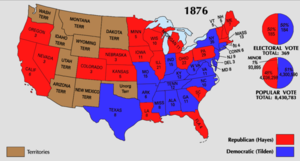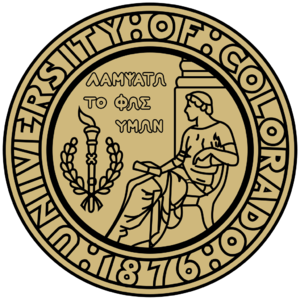Many thanks to our Patrons who cover ~2/3 of our hosting bill. Please join them if you can.
1876
Jump to navigation
Jump to search
1866 < 1867 < 1868 < 1869 < 1870 < 1871 < 1872 <1873 < 1874 < 1875 < 1876 > 1877 > 1878 > 1879 > 1880 > 1881 > 1882 > 1883 > 1884 > 1885 > 1886
 The 1876 United States presidential election was won by Rutherford B. Hayes after massive electoral machinations. | |
| year 1876 |
Contents
Events
January–March
- January 1
- The Reichsbank opens in Berlin.
- The Bass Brewery Red Triangle becomes the world's first registered trademark symbol.[1]
- February 2 – Third Carlist War – Battle of Montejurra: The new commander General Fernando Primo de Rivera marches on the remaining Carlist stronghold at Estella, where he meets a force of about 1,600 men under General Carlos Calderón, at nearby Montejurra. After a courageous and costly defence, Calderón is forced to withdraw.
- February 14 – Alexander Graham Bell applies for a patent for the telephone, as does Elisha Gray.
- February 22 – Johns Hopkins University is founded in Baltimore.
- February 24 – The first stage production of the verse-play Peer Gynt by Henrik Ibsen premieres, with incidental music by Edvard Grieg, in Oslo (then called Christiania), Norway.
- February 26 – The Japanese force the Korean government to sign the Japan–Korea Treaty of 1876 (having brought a fleet to Incheon, the port of modern-day Seoul), opening three ports to Japanese trade and forcing Korea's Joseon dynasty to cease considering itself a tributary of China. On China's urging, Korea also signs treaties with the European powers, in an effort to counterbalance Japan.
- February 28 – Third Carlist War: The Carlist forces do not succeed, and the promises are never fulfilled. The Carlist pretender Carlos, Duke of Madrid, goes into exile in France, bringing the conflict to an end after four years.
- Spring – Thousands of Plains Indians in the United States travel to an encampment of the Sioux chief Sitting Bull in the region of the Little Bighorn River, creating the last great gathering of native peoples on the Great Plains.[2]
- March – American librarian Melvil Dewey first publishes the Dewey Decimal Classification system.[3]
- March 2 – United States Secretary of War William Belknap resigns his office in the wake of the trader post scandal. He is later impeached by the US House of Representatives.
- March 7 – Alexander Graham Bell is granted a United States patent for the telephone.[4]
- March 10 – Alexander Graham Bell makes the first successful telephone call, saying "Mr. Watson, come here, I want to see you".
- March 20 – Through constitutional reform taking legal effect, Louis De Geer becomes the first Prime Minister of Sweden.
April–June
- April 16 – The April Uprising in Bulgaria occurs.
- May – April Uprising (Bulgaria): Batak massacre – Bulgarians in Batak are massacred by Ottoman troops. The number of victims ranges from 3,000 to 5,000, depending on the source.
- May 1 - The Royal Titles Act 1876 confers the title Empress of India upon Queen Victoria.
- May 10
- The Centennial Exposition begins in Philadelphia.
- A major pharmaceutical brand, Eli Lilly, founded in Indiana, United States.Template:Page needed
- May 11/12 – Berlin Memorandum: Germany, Russia and Austria-Hungary propose an armistice between Turkey and its insurgents.
- May 16
- British Prime Minister Benjamin Disraeli rejects the Berlin Memorandum.
- May 17 – Nicolaus Otto files his patent for the four-stroke cycle internal combustion engine.
- May 29 – The United States Senate votes 37 to 29 that US Secretary of War William Belknap cannot be barred from trial and impeachment, despite being a private citizen.
- May 30 – Abdülaziz is deposed by his nephew Murad V as Sultan of the Ottoman Empire on the grounds of mismanaging the economy; 6 days later, Abdülaziz is found dead at the Çırağan Palace in Istanbul and 93 days later Murad is deposed by Abdul Hamid II on the grounds of mental illness.
- June 4 – The Transcontinental Express arrives in San Francisco via the First Transcontinental Railroad, 83 hours and 39 minutes after having left New York City.
- June 25/26 – American Indian Wars: Battle of the Little Bighorn. 300 men of the U.S. 7th Cavalry Regiment under Lieutenant Colonel George Armstrong Custer are wiped out by 5,000 Lakota, Cheyenne and Arapaho, led by Sitting Bull and Crazy Horse.
July – September
- July 1 – Serbia declares war on the Ottoman Empire.
- July 2 – Montenegro declares war on the Ottoman Empire.
- July 8 – Reichstadt Agreement: Russia and Austria-Hungary agree on partitioning the Balkan Peninsula.
- August 1
- Colorado is admitted as the 38th U.S. state.
- The United States Senate votes to acquit former Secretary of War William Belknap of all impeachment charges relating to the trader post scandal.
- August 8 – Thomas Edison receives a patent for his mimeograph.
- August 13 – Richard Wagner inaugurates the Bayreuth Festival.
- August 31 – Murad V, Sultan of the Ottoman Empire, is deposed and succeeded by his brother Abdul Hamid II.
- September 5 – Gladstone publishes his Bulgarian Horrors pamphlet.
- September 12 – King Leopold II of Belgium hosts the Brussels Geographic Conference, on the subject of colonizing and exploring central Africa. By the event's conclusion, a new international body named the International African Association (indirect forerunner of the modern Congo state) is established.
October–December
- October 26 – José María Iglesias (1823-1891) begins his disputed presidency of Mexico.[5]
- November 7 - U.S. presidential election, 1876: After long and heated disputes, Rutherford B. Hayes is eventually declared the winner over Samuel Jones Tilden.
- November 10 – The Centennial Exposition ends in Philadelphia, Pennsylvania.
- November 23 – Corrupt Tammany Hall leader William Marcy Tweed (better known as Boss Tweed) is delivered to authorities in New York City, after being captured in Spain.
- November 25 – American Indian Wars: Dull Knife Fight – In retaliation for the dramatic American defeat at the Battle of the Little Bighorn, United States Army troops under General Ranald S. Mackenzie sack Chief Dull Knife's sleeping Cheyenne village at the headwaters of the Powder River (the soldiers destroy all of the villagers' winter food and clothing, and then slash their ponies' throats).
- November 29 – Porfirio Díaz becomes President of Mexico.
- December – The first American edition of Mark Twain's The Adventures of Tom Sawyer is published by the American Publishing Company; a British edition has appeared in early June in London with the first review appearing on June 24 in a British magazine.
- December 2 – Chugai Economic Daily, as predecessor of Nikkei Economic Daily (Nihon Keizai Shinbun), is first issued in Tokyo, Japan.
- December 6 – The first cremation in the United States takes place, in a crematory built by Francis Julius LeMoyne at North Franklin Township, Washington County, Pennsylvania.
- December 23 – Constantinople Conference opens.
Date unknown
- The Northern Chinese Famine of 1876–79, which will claim 30 million lives and become the 5th worst famine in recorded history, begins after the droughts of the previous year.
- Tanzimat ends in the Ottoman Empire.
- Adolphus Busch's brewery, Anheuser-Busch in St. Louis, Missouri, first markets Budweiser, a pale lager, as a nationally sold beer.
- Charles Wells opens his brewery, based in Bedford, England.
- In Düsseldorf, German company Henkel is founded.
- Construction of Spandau Prison in Berlin is completed.
- Samurai are banned from carrying swords in Japan, and their stipends are replaced by a one-time grant of income-bearing bonds.
- Lars Magnus Ericsson starts a small mechanical workshop April 1 in Stockholm and partners up with Carl Johan Andersson April 27, Sweden, dealing with telegraphy equipment, which grows into the worldwide company Ericsson.
- Star Oil Company, as predecessor of Chevron, an energy product and sales brand on worldwide, founded in California, United States.
Events
| Event | Start | End | Description |
|---|---|---|---|
| Pax Brittanica | 1815 | 1915 | |
| Victorian era | 1840 | 1901 | |
| US/1876 Presidential election | 7 November 1876 | 7 November 1876 |
New Groups
| Group | Image | Type | Description |
|---|---|---|---|
| Johns Hopkins University |  | Military ranks | Only a short drive from Washington DC, it is a major deep state milieu. |
| US/Coast Guard/Academy |  | U.S. Service Academy | Service academy of the United States Coast Guard. |
| Eli Lilly |  | Psychiatric drugs,Prozac, MKUltra... | |
| University of Colorado at Boulder |  | Public Flagship Space-grant | pUBLIC university in Boulder, Colorado |
| Calvin College |  | Private liberal arts college | A private Christian (Calvinist) university |
| University of Colorado |  | A system of public universities in Colorado consisting of four campuses | |
| University of Oregon |  | PublicFlagshipResearch | Pioneer in Molecular Biology |
| University of Northern Iowa |  | Midwestern university |
A Death
| Title | Born | Died | Summary | Description |
|---|---|---|---|---|
| Mikhail Bakunin | 30 May 1814 | 1 July 1876 | Author Activist Anarchism | Russian anarchist writer |
Births
| Title | Born | Place of birth | Died | Summary | Description |
|---|---|---|---|---|---|
| Konrad Adenauer | 5 January 1876 | Germany Cologne | 19 April 1967 | Politician | German (deep?) politician, CDU leader |
| Stephen Alley | 14 February 1876 | Russia Moscow | 6 April 1969 | Spook | British intelligence officer who was part of the plot to assassinate Grigori Rasputin. |
| Eugenio Pacelli | 2 March 1876 | Italy Rome | 9 October 1958 | Pope | Pope Pius XII 1939-1958 |
| Reginald Holland | 15 March 1876 | 14 September 1948 | Deep state operative | UK Deep state operative | |
| Harold Williams | 6 April 1876 | New Zealand Auckland | 18 November 1928 | Journalist Teacher Polyglot | A polyglot who learned over 50 languages |
| Louis McFadden | 25 July 1876 | Pennsylvania Granville Center Troy Township Bradford County | 1 October 1936 | Politician Banker | U.S. politician who at the end of his career opposed the US Federal Reserve. Died unexpectedly of "intestinal flu" in 1936, after two previous attacks against his life. |
| Eric Drummond | 17 August 1876 | Fulford UK | 15 December 1951 | Diplomat Politician | Secretary General of the League of Nations 1920-1933 |
| Kim Ku | 29 August 1876 | South Korea Baegun-dong Haeju Hwanghae | 26 June 1949 | Politician | An assassinated Korean politician -possibly by the Counterintelligence Corps or their stooge Syngman Rhee. |
| Claude Dansey | 10 September 1876 | Kensington UK | 11 June 1947 | Spook | Began his career in intelligence in 1900, and remained active until his death in 1947. |
| Culbert Olson | 7 November 1876 | 13 April 1962 | Politician Lawyer | 29th governor of California from 1939 to 1943. | |
| George Creel | 1 December 1876 | 2 October 1953 | Author Politician Propagandist | World War I propagandist. Headed the "Creel Commission" to try to get the US public to support involvement in WWI. | |
| Irénée Du Pont | 21 December 1876 | US Delaware New Castle | 19 December 1963 | Deep politician Billionaire Businessperson | Poisoning the US with tetraethyl lead and other chemicals as head of DuPont. A central figure in the unsuccessful 1934 Business Plot to install a puppet leader in US White House. |
Many thanks to our Patrons who cover ~2/3 of our hosting bill. Please join them if you can.
References
- ↑ http://www.ipo.gov.uk/tm/t-find/t-find-number?detailsrequested=C&trademark=1
- ↑ http://www.smithsonianmag.com/history-archaeology/How-the-Battle-of-Little-Bighorn-Was-Won.html
- ↑ http://www.gutenberg.org/files/12513/12513-h/12513-h.htm
- ↑ Patent #174,466.
- ↑ https://web.archive.org/web/20190530050638/http://calderon.presidencia.gob.mx/mexico/gobernantes/mexico-1821-actualidad/jose-maria-iglesias/